Have you ever been headbutted by your dog and wondered why they do it? It’s an adorable behavior, but one that can be confusing to humans. Dogs have a range of behaviors that are used as communication tools, and headbutting is one of them. So what does it mean when your dog headbutts you? Understanding the reasons behind this behavior can help you better connect with your pup. In this article, we’ll explore why dogs may perform the act of headbutting and how to best respond to it.
What Does It Mean When A Dog Headbutts You?
Headbutting, also known as “bunting”, is a sign of affection and respect. Dogs may use their heads to nudge, rub, and solicit attention from their humans. The behavior also serves as a way for them to mark their territory by secreting oils from their head onto you. This is similar to how they would mark things in the wild, such as trees and rocks, with their scent.
It’s important to note that headbutting is a communication tool, and not an aggressive one. Dogs may also use it when they want to be petted or show that they love you. If your pup headbutts you, it’s best to reward them with a scratch behind the ears or a belly rub.
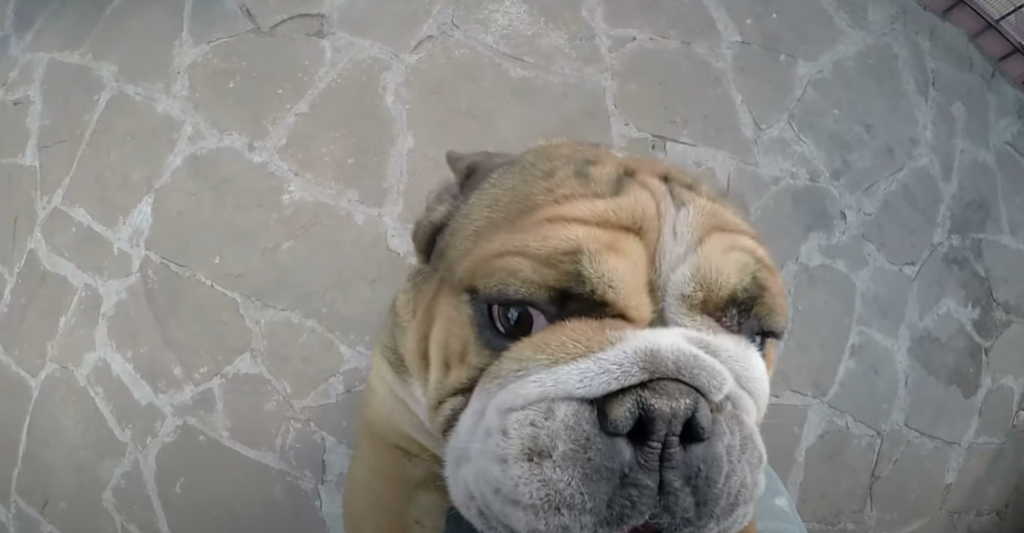
Is It A Bad Thing For My Dog To Headbutt Me?
No, it’s not necessarily a bad thing. In fact, headbutting is often seen as a sign of affection or submission from your dog. It’s typically a way for them to communicate their love and loyalty to you, or even show that they are acknowledging your authority or dominance. Headbutting can also be seen as an invitation to play or cuddle. It is important, however, to make sure that your dog is not being too aggressive when they headbutt. If they are, it’s best to let them know that this behavior is not acceptable and redirect their attention to something else. Additionally, if you don’t want your dog to headbutt you, it’s important to never reward this behavior with any kind of positive reinforcement, such as treats or petting. [1]
Should I Be Worried If My Dog Is Headbutting Me?
In most cases, headbutting is a sign of affection and should not be cause for concern. Dogs will typically only headbutt their owners and people they are comfortable with, so it is usually an indication that your pup is happy and content. However, if you feel uncomfortable with your dog headbutting you, it is important to speak to a veterinarian or behavior professional.
It is also important to make sure that your dog’s headbutting is not a sign of aggression. Although some dogs may nudge their owners gently with their head, other dogs may do it more forcefully. If your dog is headbutting you too hard or if it seems like they are trying to assert dominance, then it is a cause for concern. If this is the case, you should try to redirect your dog’s attention by engaging them in play or providing them with a toy.
Reasons Why Your Dog Headbutts You
Many dog owners have probably noticed the headbutting behavior of their canine friends and may wonder what it means. Headbutting is a common behavior that dogs engage in to show their affection and strong bond with their owners. So why does your dog headbutt you? Here are some possible explanations:
The Dog Is Excited
The most common reason your dog headbutts you is because it’s excited to see you and wants to show its affection. Dogs headbutt to show their love and appreciation for you. They want to rub noses with you, so it’s like a “hugs and kisses” greeting, just with their head.
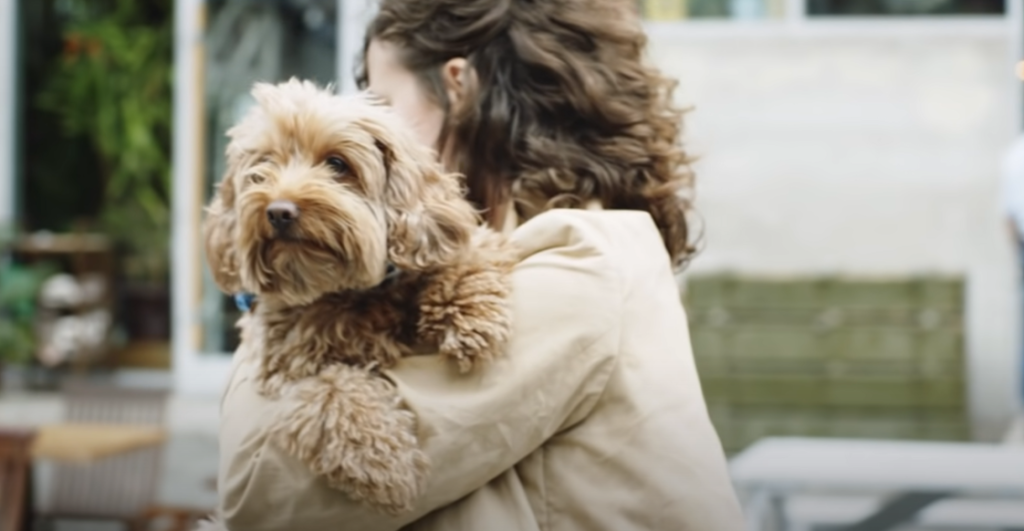
Instinctive Trait To Herd
Headbutting is an instinctive trait that many dogs have inherited from their wolf ancestors. Wolves use headbutting to herd and control other pack members. Similarly, your dog may be trying to lovingly herd you in the right direction or even just get attention from you. In other words, they may be trying to show you that they are the leader of their pack.
Your Dog Needs Some Attention
It’s likely that your pup headbutting you is a sign of affection; they simply want some attention from you! Dogs are incredibly social animals, and it’s normal for them to want some human interaction. If you notice your pup headbutting you whenever you are around, it could be a sign that they need a bit more love and attention.
It Is Hungry
One of the primary reasons why your dog may be headbutting you is because it needs attention or something else that you can provide, such as food or water. Dogs are social creatures that desire interaction and affection from their humans; if they don’t get it, they may start nuzzling, or headbutting, their humans as a way to get their attention. If your pup is headbutting you for attention, it may be beneficial to spend more time playing or cuddling with your pup. Additionally, it could also mean that your pup is hungry and wants food, so make sure to check if its bowl is empty.
The Dog Wants To Play
Many pet owners may have experienced the sensation of having their beloved dog headbutt them. While it can be startling, this behavior is actually a sign of affection. Dogs often use their head and nose to show that they like somebody or want to initiate playtime. This behavior is similar to how cats rub against people to show affection, just more direct. Most often, when a dog headbutts their owners or a playmate, it is to invite a game of tug, chase, or fetch.
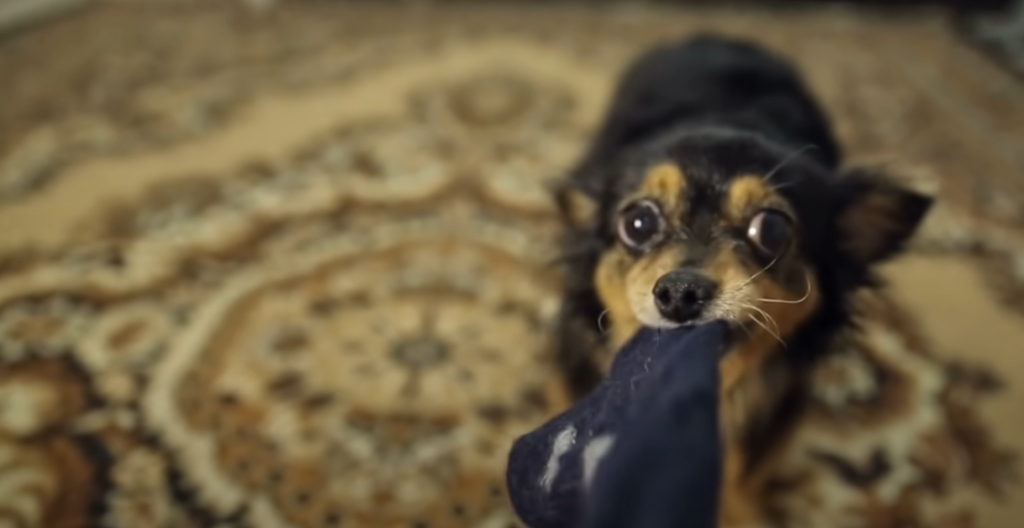
It Is Marking You
Headbutting is a common form of greeting and bonding in the animal kingdom. When your dog headbutts you, this can be interpreted as a sign of affection, as it is a way for them to mark you with their scent. By pressing their forehead against you, they are leaving behind a scent that is unique to them, providing comfort and assurance. This behavior can be particularly pronounced if you are away for any length of time – they may headbutt you when they see you to reaffirm your bond. It is important that owners recognize this behavior for what it is – a sign of affection and recognition, not aggression.
It Is Their Love Language
Headbutting is a sign of affection for many dog breeds. Dogs use headbutting to show their love and bond with you. It is their way of saying, “I love you!” They may also do it to express excitement or joy when they see you after a long day or to get your attention. Headbutting is like a hug, but with their head instead of our arms! Some breeds even use it to nuzzle up against you and seek comfort. While it might feel funny or a bit uncomfortable at times, your pup is just expressing their love in their own way.
They Do Not Feel So Good
Headbutting can be a sign that your dog doesn’t feel good. Your pup might be feeling anxious, stressed out or uncomfortable and they might be trying to communicate this to you. If your pup has been headbutting for a while and it doesn’t seem to be going away, it might be time to take them to the vet for a checkup.
The Dog Feels Anxious Or Scared
One reason why your dog may be headbutting you is because he or she feels anxious or scared. Dogs may use headbutting as a way to show their affection or as a calming behavior. This is especially true when you first meet a new dog; they may headbutt you as a way of getting to know you and showing that they trust you. Headbutting can also be a sign that your dog is feeling stressed or overwhelmed, such as during a thunderstorm or fireworks display. In this case, it’s important to provide your dog with extra comfort and reassurance to help them feel more at ease.
The Dog Is Testing You
Headbutting is a common way for your dog to test boundaries with you. By doing it, they are trying to understand how far they can go and how much attention they can get. This is especially common if your dog has had an unstable past with its owners or the environment it came from.It can also be a sign that your dog is trying to get higher in the pack hierarchy. By headbutting you, they are trying to establish themselves as the one in control and higher up than you.
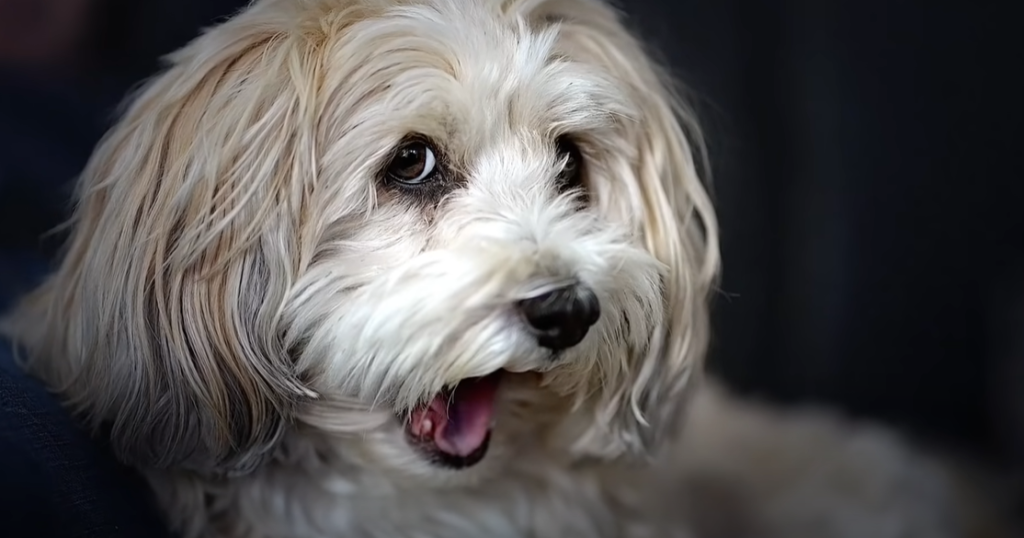
Certain Dog Breeds Like Headbutting
Certain dog breeds have a tendency to headbutt people as part of their natural behavior and body language. Breeds like the Labrador Retriever, Greyhound, and Bulldog may be more likely to engage in headbutting than other breeds. This behavior has a few different meanings depending on the context. For example, if you’re petting your pup and they headbutt you it could be an invitation for more love and attention. [2]
How To Stop Your Dog From Head Butting You
Headbutting can be a cute way to show your dog’s affection, but it can also be a sign that they’re feeling overwhelmed and need some space.
Feed Them On Time
One of the main reasons why a dog may headbutt you is because they’re hungry and want to be fed. If your dog is headbutting you, try feeding them on time. This will help to address their underlying need for food and prevent them from getting desperate enough to headbutt you.
Remove Any Stressors
If your dog is headbutting you or other people, it’s important to try and identify any potential stressors in their environment. Unfamiliar people, new pets or a change in routine can all cause stress for your pup. Removing these stressors and providing a calm environment for your pup can reduce their headbutting behavior.
Find Out What They Want
When your pup headbutts you, it’s likely they are trying to communicate something. The most obvious answer is that they are trying to show you love and affection. Dogs probably inherited this behavior from their wolf ancestors who used it as a way of showing dominance and submission during social interactions. In the same way, when your pup headbutts you they could be trying to show that they recognize you as their leader and trust you. It’s also possible that they are trying to get your attention or asking you for something. If they do this after you have been away for a while, it could be because they are excited to see you and want to be around you!
Don’t Reinforce This Behavior
Headbutting may be cute and endearing, but it’s important not to reward this behavior. If your dog is headbutting you, it’s important to remember not to encourage them by giving them attention or treats. Not only will this reinforce the behavior, but it could also lead to more serious issues such as aggression.
Talk To A Dog Behaviorist
Headbutting can be a sign that your dog is trying to communicate with you and wants something from you. If it seems like your pup is trying to get your attention, consider talking to a certified dog behaviorist. A dog behaviorist will be able to help you understand what’s motivating your pup to headbutt and find a plan that works for both of you. [3]
Why Is My Dog Headbutting Other Dogs?
Headbutting in dogs is a common behavior that is seen in various forms. Much like headbutting humans, headbutting other dogs is a sign of affection and can be seen as a way of strengthening the bond between two dogs. Headbutting other dogs is also a way to establish dominance in the relationship. It can be a sign that one dog is trying to take over another’s space or territory.
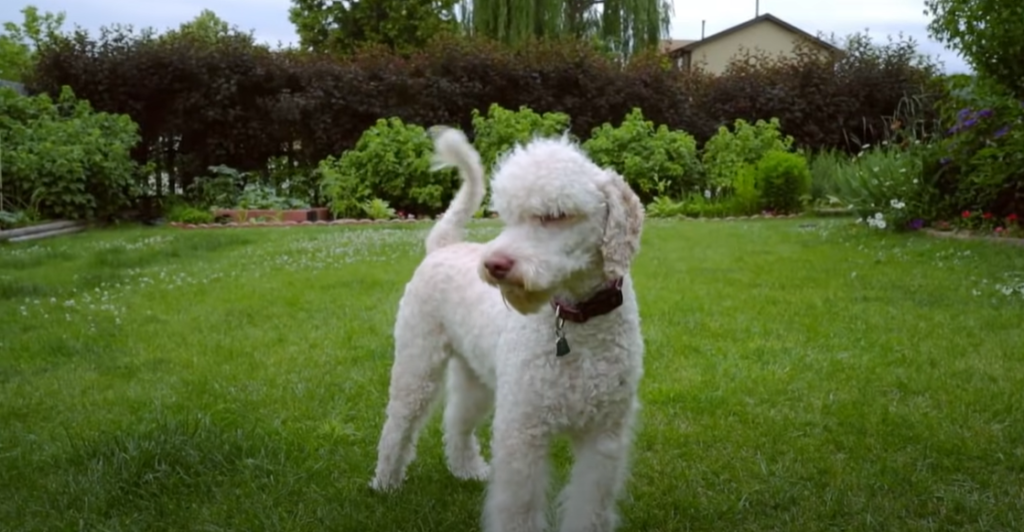
Beware Of Strange Twitches And Head Bobbing
Headbutting is one of the more unique behaviors dogs display, but it has a simple explanation. When your pup headbutts you, he is actually trying to show you his love and affection. He may also do it out of habit, as something he’s picked up from previous owners.
If your pup is headbutting or displaying strange twitches and bobbing his head, it’s important to get to the root of the behavior. This behavior could be indicative of a medical issue, such as an ear infection or neurological disorder. If you notice your pup displaying strange behaviors, it’s best to take him to the vet.
Finally, it’s important to remember that headbutting is a sign of affection from your pup. If he headbutts you, take it as a sign that he loves you and wants to spend time with you. Take the opportunity to give him some extra love in return! [4]
FAQ
Why does my dog headbutt his food bowl?
Your dog may be headbutting his food bowl for a few different reasons. One of the most common explanations is that it’s a sign of excitement and anticipation for mealtime. Dogs often use headbutting as a way to show their enthusiasm and get their owners’ attention. Another explanation could be that your dog is experiencing some sort of discomfort or pain in their neck and head area. This could be caused by an underlying medical condition such as arthritis, so it’s important to consult with your veterinarian if this behavior continues. It may also be a sign that something is wrong with your dog’s food bowl, like it is too low for them to comfortably eat from, or that the food has become stale. If so, try switching to a different bowl or refreshing your pup’s meals more frequently.
Is It a Bad Thing for My Dog to Headbutt Me?
No, headbutting isn’t necessarily a bad sign or a sign of aggression. It could be that your dog is trying to show you love and affection. Some dogs have been known to headbutt their owners as a sign of trust, respect, and appreciation. If your pup’s headbutting is accompanied by other behavioral signs of affection, such as licking your face or wagging their tail, then chances are they are expressing affection to you.
What Not to Do When Your Dog Headbutts You?
When your dog headbutts you, it’s important to remember not to punish them in response. Punishing your pup won’t help them understand why their behavior is wrong, as they’re simply expressing a natural instinct. Instead, try one of the following methods to discourage this behavior:
- Redirect their attention
- Praise them
- Give them space
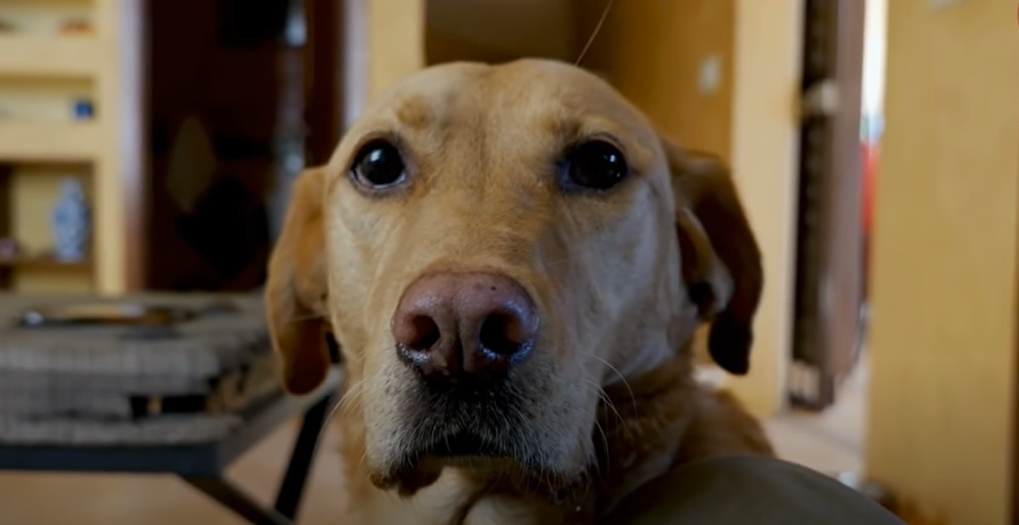
Is It Normal For Dogs To Headbutt You?
Yes, it is normal for dogs to headbutt you. In fact, they may be trying to tell you something! Dog headbutting is a common behavior, often seen in dogs as a way of expressing affection and seeking attention. The headbutt is also known as “root waving”, and it is thought to be a way of greeting or showing that they are happy. Headbutting can also be a sign of submission, and some dogs may even do it to assert their dominance. Sometimes, headbutting can also be a way of communicating that they need something, such as food or a walk.
Should You Let Your Dog Headbutt You?
Headbutting may seem cute and endearing, but it can also be a sign of aggressive behavior. If your dog is headbutting you or other people too often, this should be addressed as soon as possible to prevent further problems from occurring.
When trying to determine if your dog’s headbutting is a sign of aggression, take into account their body language. If they are showing signs of stress or aggression (such as hackles raised and lips curled back) then it is not recommended that you let your dog continue with the behavior.
It can also be helpful to look at the context of when the headbutting occurs – if it usually happens right before you are about to leave or when someone else is around, then it may be a sign that your dog is trying to assert dominance over you.
Why Does My Dog Bury His Head in Me?
Dogs have a variety of ways to show affection, one of which is burying their head in you. When your pup presses his forehead or nose into you, it’s a sign that he loves and trusts you. This behavior, often referred to as “headbutting,” can also be seen between two dogs when they greet each other.
Headbutting is a canine-specific behavior, known as an “Allopreening” that is used mainly amongst pack animals. This type of contact serves to form strong bonds between the members of the group and it’s a sign of love and acceptance from one dog to another.
It’s not just a sign of affection, though. Dogs will also headbutt to get your attention and to request favors like food or a walk.
Why does my dog headbutt things?
There are many theories as to why dogs headbutt things. It could be a sign of affection, dominance, or even an expression of boredom. One theory suggests that when a dog headbutts something, he is trying to mark his territory. He may believe that if he headbutts an object or person, then it is his and no one else’s. Another theory suggests that headbutting is an attempt to “pet” someone or something, since dogs don’t have hands like humans do.
Why does my dog headbutt my cat?
Your cat may be experiencing the same headbutting behavior from your dog for a variety of reasons. Dogs often rub their heads against other animals as a sign of social bonding, as a way to assert dominance, or simply out of excitement. If your dog is headbutting your cat frequently and aggressively, it may be an attempt to show dominance. If this is the case, it’s best to separate the two animals until you can train your dog to be more respectful and calm around the cat.
My dog headbutted me in the nose?
Headbutting is a common behavior among some dog breeds. It’s often seen as an act of affection, in which they want to cuddle and be close to you. Some dogs may headbutt as a way to mark their territory or express dominance, but when directed at a family member, it usually means love. If your pup headbutts you in the nose, it likely means they’re trying to get your attention and show their appreciation for you. In rare cases, headbutting can be a sign of aggression or fear, so it should be monitored closely to ensure it doesn’t become a habit. Headbutting can also be an attention-seeking behavior, in which the dog might want something from you, such as food or a toy.
Dog head butting other dogs?
Dogs might also headbutt another dog, as a way to show dominance or affection. By bumping their heads against each other, dogs are often conveying a message of social acceptance. This is common among puppies who are still learning how to interact with others, and adult dogs who are trying to establish a social hierarchy. Though headbutting might seem a bit strange from our human perspective, it’s an important form of communication for our canine friends.
Why does my cat headbutt me?
Cats headbutt their owners for a few different reasons. Cats often show affection by rubbing their heads against the person they love, and this can sometimes be accompanied by a headbutt. Cats also may rub their heads against their owners to show dominance or mark their territory. Additionally, cats use headbutting to show that they are seeking attention. If your cat is headbutting you, it could be a sign of love and affection or an attempt to gain focus and attention. It is important to remember that cats can become aggressive when they don’t get what they want, so be sure to give your furry friend lots of love and attention when they headbutt you!
Useful Video: Why is My Dog Pawing at Me? Here’s 10 Reasons!
Conclusion
Headbutting is a form of communication that dogs use with humans and other animals to show their affection, assert dominance, or seek attention. It is an expression that most dogs share and can be comforting or annoying depending on the situation. While it is usually harmless, some aggressive headbutting can require training to control. If your pet is headbutting you too often or with excessive force, it may be a sign that they are stressed, anxious, or need more attention. Taking the time to understand why your pup is headbutting you can help both of you establish a better relationship and find a solution that works for everyone.
References:
- https://dogtravelbuff.com/why-does-my-dog-headbutt-me/
- https://joypetproducts.com/why-does-my-dog-headbutt-me/
- https://notabully.org/why-does-my-dog-headbutt-me/
- https://www.doggietoys.deals/blog/why-does-my-dog-headbutt-me/

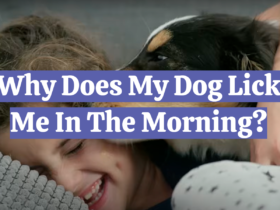
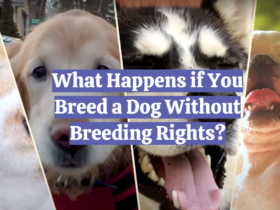
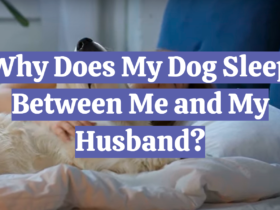
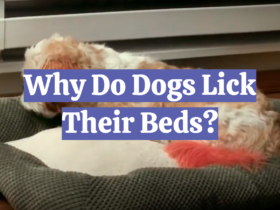
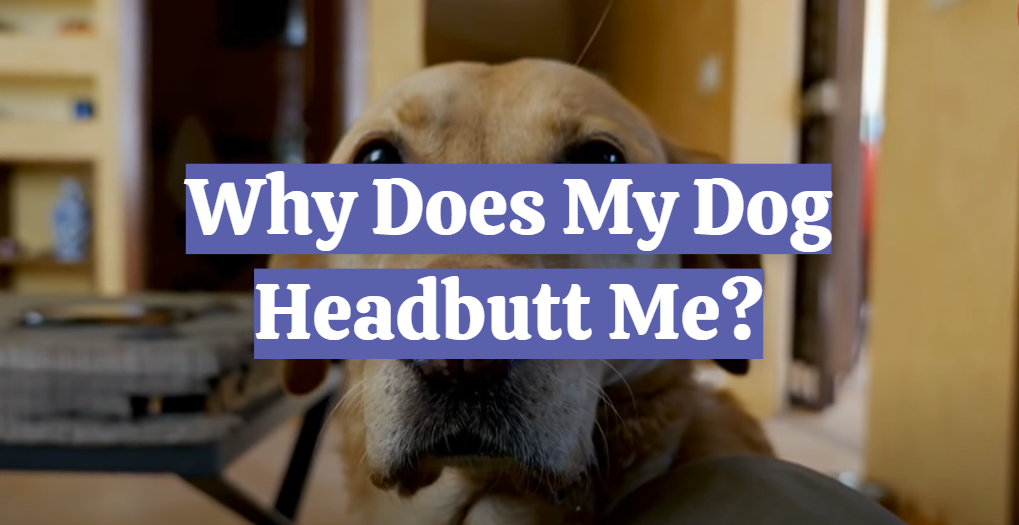

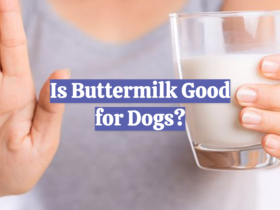
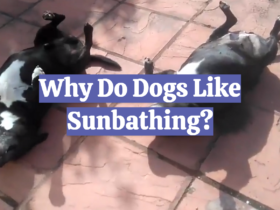
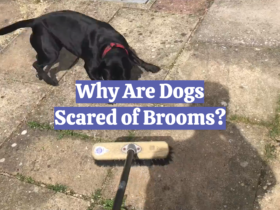
My dog’s endearing habit of headbutting me has become a cherished aspect of our bond. From my perspective, it’s his way of seeking affection and attention. It often happens when I’m sitting on the couch, and he nudges his head under my hand, prompting me to shower him with pets and scratches. It feels like our own special form of communication, a silent request for a moment of connection that never fails to warm my heart.
Recently, I’ve come to understand that my dog’s headbutting is a multi-faceted form of communication. Beyond seeking affection, I’ve noticed he headbutts when he’s excited or eager for playtime. It’s as if his joyful energy can’t be contained, and he expresses it by gently bumping into me. This behavior has added a playful and dynamic dimension to our interactions, turning ordinary moments into delightful exchanges of energy and affection.
Dealing with my dog’s headbutting, I’ve learned that it’s not just about physical contact; it’s a display of trust and intimacy. During moments of vulnerability, like when he’s sleepy or just waking up, he leans in with his head, resting it against me. It’s a silent reassurance that he feels safe and secure in our relationship. This revelation has deepened my appreciation for the emotional richness that dogs bring to our lives.
My dog’s headbutting has become a source of comic relief and joy in our daily routine. Especially during fetch sessions, after he excitedly retrieves the ball, he’ll headbutt me, almost as if saying, “Let’s do it again!” It’s a lighthearted and whimsical expression of his enthusiasm for our shared activities. This playful headbutting has turned our playtime into a series of joyful and spirited interactions, creating lasting memories.
Recently, I’ve noticed my dog headbutting when he senses I’m feeling down or stressed. It’s like he has an intuitive understanding of my emotions and offers comfort in the most genuine way. The gentle nudge of his head seems to convey empathy and support, reminding me of the incredible emotional intelligence that dogs possess. This behavior has become a source of solace, turning challenging moments into opportunities for connection and understanding.
Exploring the nuances of my dog’s headbutting has revealed its role in establishing social hierarchy. During interactions with other dogs, I noticed that headbutting is a common behavior to assert dominance or signal submission. Interestingly, this translates into our relationship as well. When he headbutts me, it’s his way of affirming our bond and acknowledging our unique pack dynamic. This realization has deepened my understanding of the intricate social dynamics that dogs bring into their relationships with humans.
Recently, my dog’s headbutting took on a new significance when I learned that it’s linked to scent marking. Dogs have scent glands in their heads, and by nudging or headbutting, they transfer their scent onto me. This isn’t just a physical act; it’s a way for him to mark me as a part of his territory and family. It’s fascinating to think that this seemingly simple behavior is a form of communication that goes beyond the physical touch, leaving an olfactory signature that strengthens our bond.
Dealing with my dog’s headbutting became a puzzle until I discovered its role in seeking my attention. I realized that when he nudges his head against me, he’s gently demanding my focus and engagement. This behavior is particularly pronounced when I’m preoccupied with work or chores. It’s his subtle way of saying, “Hey, I’m here, and I want your company.” Understanding this has made me more attuned to his needs and reinforced the importance of quality time in our relationship.
My dog’s headbutting revealed itself as a form of play initiation during our daily walks. Whenever we encounter an open field or a spacious area, he’ll headbutt my leg or side, signaling that it’s time for a game of chase or fetch. It’s his way of injecting excitement into our outdoor adventures. This realization has turned our walks into dynamic and interactive experiences, creating a harmonious balance between exercise and play.
I’ve come to appreciate my dog’s headbutting as a form of non-verbal communication when he’s feeling unwell. During a bout of sickness, he would rest his head against me, seeking comfort and reassurance. This behavior became a poignant reminder of the silent bond we share, where physical touch becomes a source of solace and support during challenging moments. It’s a testament to the depth of our connection and his ability to convey vulnerability in the most subtle yet profound ways.
Delving into the intricacies of my dog’s headbutting unveiled its role in boundary-setting within our home. In situations where he feels the need to establish a sense of territory, he gently headbutts doorways or furniture. It’s as if he’s leaving his mark, defining the boundaries of his space. Understanding this behavior has prompted me to create designated areas that cater to his need for a secure and marked territory, fostering a sense of comfort within our shared living space.
Recently, I noticed a fascinating correlation between my dog’s headbutting and his emotional state. During moments of heightened excitement or joy, his headbutting becomes more pronounced and energetic. It’s a non-verbal expression of exuberance, a physical manifestation of his positive emotions. This realization has added a new layer of depth to our interactions, allowing me to gauge and reciprocate his emotional highs in a way that strengthens our bond.
Dealing with my dog’s headbutting led me to explore the concept of canine communication through touch. Through research and observation, I learned that headbutting is a common form of tactile communication among dogs. In our case, it’s his way of conveying affection, trust, and a desire for closeness. This insight has transformed the way I interpret his headbutts, recognizing them as a profound form of canine expression that goes beyond mere physical contact.
My dog’s headbutting unveiled itself as a dynamic form of negotiation during shared activities. For instance, before settling down for a cuddle session, he often headbutts my hand, signaling that he wants to be petted or scratched in a specific way. It’s a subtle negotiation, and responding to his cues enhances the quality of our shared moments. This revelation has turned our interactions into a collaborative dance, where each headbutt becomes a cue for the next step in our shared activities.
Recently, I’ve come to appreciate my dog’s headbutting as a means of inviting me into his world of sensory exploration. When we encounter new scents during walks, he’ll headbutt my leg or shoe, as if saying, “Check this out!” It’s a collaborative investigation, a shared exploration of the olfactory wonders around us. This realization has made our walks more interactive, fostering a sense of partnership as we navigate the rich tapestry of scents in our environment.